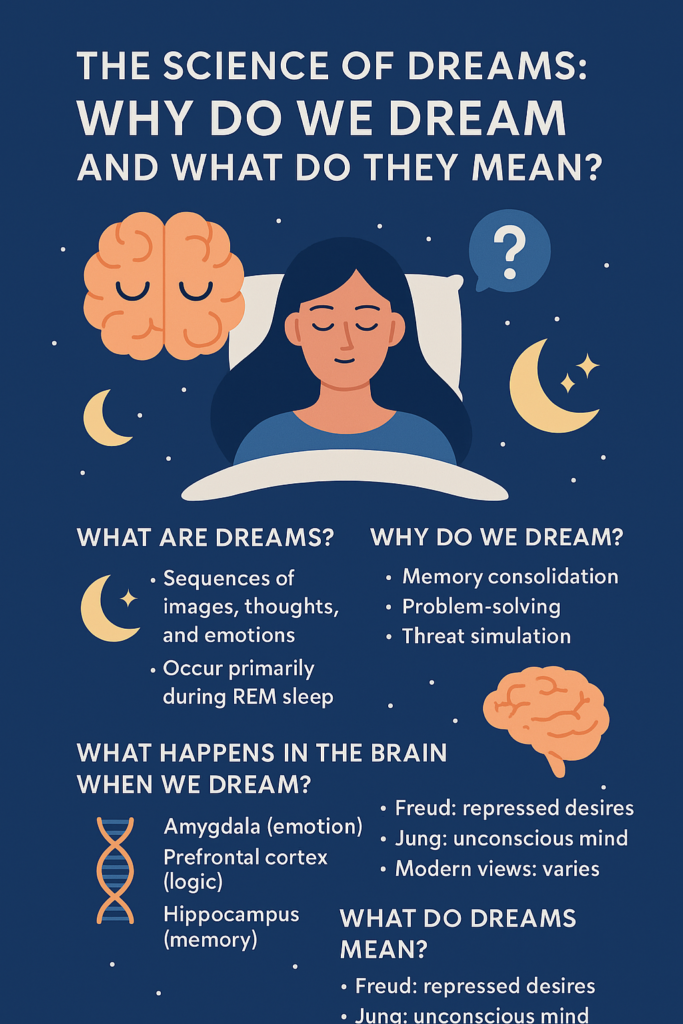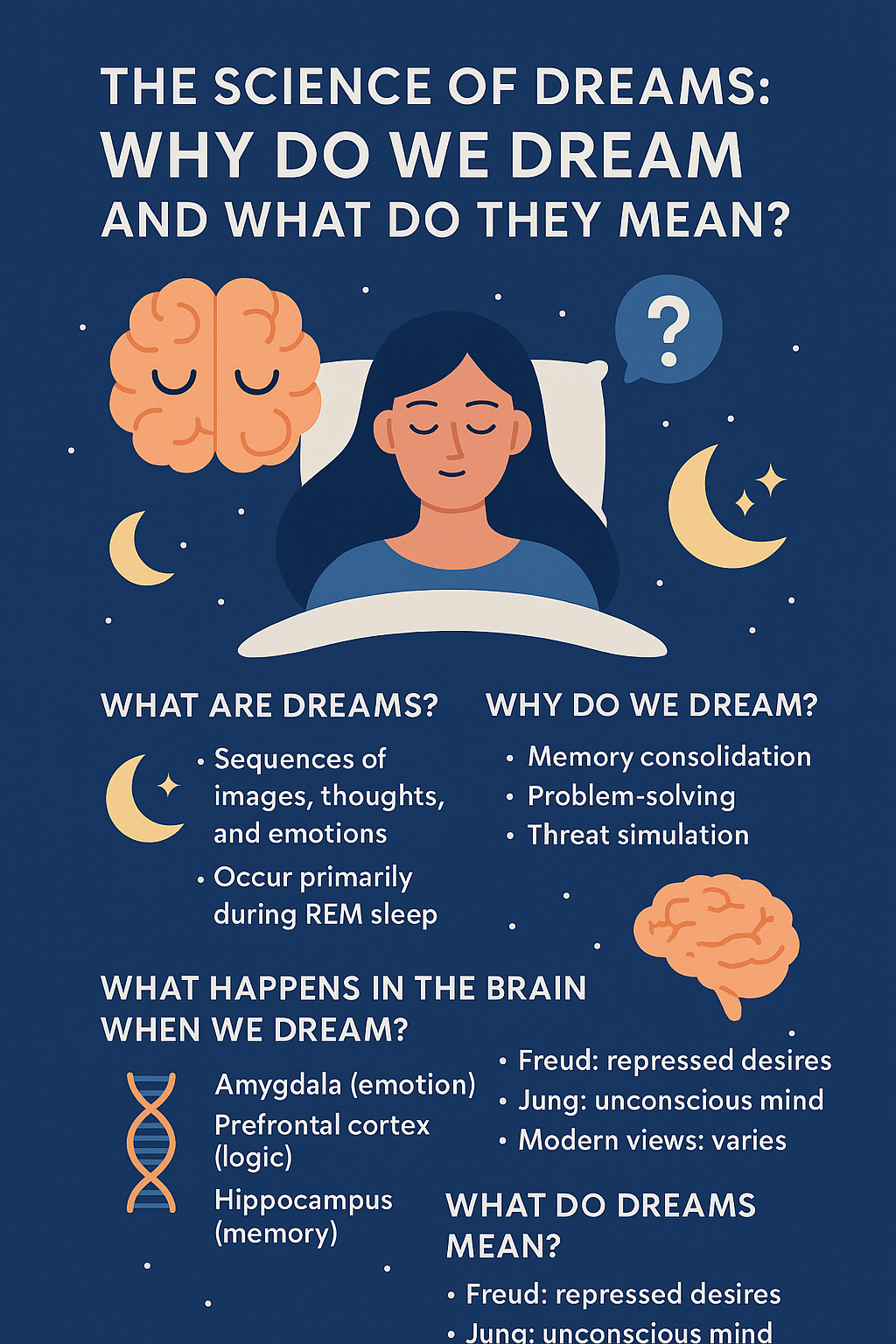
Have you ever woken up from a vivid dream and wondered, “What did that even mean?” Dreams have fascinated humanity for millennia — from ancient Egyptians who believed dreams were divine messages to modern scientists exploring neural activity during sleep. But why do we dream? And what do our dreams actually mean?
In this blog, we’ll explore the latest science behind dreams, how they happen, and the theories behind their meaning.
🧠 What Are Dreams?
Dreams are sequences of images, thoughts, and emotions that occur primarily during the REM (Rapid Eye Movement) stage of sleep. During REM, your brain becomes almost as active as it is while you’re awake, despite your body being temporarily paralyzed.
According to the National Institute of Neurological Disorders and Stroke (source), REM sleep typically begins about 90 minutes after falling asleep and occurs in cycles throughout the night.
🧬 Why Do We Dream? The Scientific Theories
Scientists still debate the purpose of dreams, but several leading theories have emerged:
1. Memory Consolidation Theory
This theory suggests that dreaming helps your brain process and store information from the day. According to a study by Harvard Medical School (source), dreams are closely tied to memory consolidation, especially emotional memories.
2. Problem-Solving Theory
Ever heard the phrase “sleep on it”? Some researchers believe dreams help us solve real-life problems. In fact, famous inventions and discoveries — like the periodic table and the sewing machine needle — were inspired by dreams.
3. Threat Simulation Theory
This evolutionary perspective suggests that dreaming lets us practice dealing with threats in a safe space. By simulating dangerous scenarios, our ancestors may have better prepared themselves for survival.
4. Activation-Synthesis Hypothesis
Proposed by researchers Hobson and McCarley, this theory claims that dreams are the brain’s way of making sense of random neural activity during REM sleep.
🌙 What Happens in the Brain When We Dream?

During REM sleep:
- The amygdala (emotion center) is highly active.
- The prefrontal cortex (logic and reasoning) is less active.
- The hippocampus (memory) engages with emotional and autobiographical content.
This mix might explain why dreams can be emotional, nonsensical, or vividly weird.
In a 2007 study published in Nature Neuroscience (source), researchers used brain scans to show how different areas light up during dreams, particularly those involved in emotion and memory.
🌀 Lucid Dreaming: When You Know You’re Dreaming
Lucid dreams are dreams where the dreamer becomes aware they’re dreaming — and sometimes, can control the dream. Studies from Stanford University suggest lucid dreaming might be a unique hybrid state between REM sleep and wakefulness.
Lucid dreamers often report flying, time travel, or visiting fantasy worlds — all while knowing none of it is real. If you’re curious to try it, practices like reality checks, dream journaling, and the MILD technique can help.
🔮 What Do Dreams Mean?
Here’s where science meets subjectivity. While the neuroscience behind dreams is being researched, interpreting dreams has been a psychological pursuit since Sigmund Freud published “The Interpretation of Dreams” in 1899.
Freud believed dreams were symbolic, representing repressed desires. Carl Jung, on the other hand, saw dreams as messages from the unconscious mind — offering insight, healing, or even warnings.
Today, modern psychologists take a more nuanced view:
- Some dreams may reflect unresolved emotions or daily stresses.
- Others may just be random fragments without deeper meaning.
If you’re curious about interpreting your dreams, check out DreamsCloud (link) — a popular platform for dream journaling and interpretation.
💭 Common Dream Themes and Possible Interpretations
| Dream | Possible Meaning |
|---|---|
| Falling | Insecurity, fear of failure |
| Being chased | Avoidance, stress |
| Losing teeth | Anxiety about appearance or loss |
| Flying | Desire for freedom or control |
| Taking an exam | Performance anxiety |
Note: Interpretations vary based on personal context and culture. A dream of flying might be thrilling for one person and terrifying for another.
🧘♂️ Can You Influence Your Dreams?
Yes! This is called dream incubation — the process of planting a seed in your mind before sleep to influence your dreams. Try writing down a question or visualizing a scenario before bed. Meditation, good sleep hygiene, and avoiding screens at night can also help promote vivid and meaningful dreams.
Apps like Awoken for Android or Lucidity for iOS can help you track and guide your dream life.
🛏️ Why Remembering Dreams Can Be Tricky
Most people forget their dreams within minutes of waking up. That’s because the brain doesn’t transfer short-term dream memories to long-term storage unless you wake up during or right after REM sleep.

Tips to remember dreams:
- Keep a dream journal beside your bed.
- Don’t move or open your phone right after waking up — stay still and try to recall.
- Use a voice recorder to capture dream fragments quickly.
🌐 Final Thoughts
Dreams are a beautiful mystery — part science, part subconscious poetry. While researchers continue to uncover how and why we dream, one thing is certain: our sleeping minds have stories to tell.
So next time you wake up wondering, “What was that all about?”, remember — even if it’s just neurons firing, it might also be your inner self speaking in symbols.

